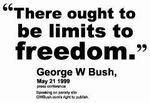
If you are a Quaker, a pacifist, or merely opposed to Bush's pre-emptive war, you and your activities may be listed in the secret 400-page Defense Department document obtained by NBC News.
In case you didn't already know it, your government does not approve of dissenting Americans.
MSNBC: [snippets]
WASHINGTON - A year ago, at a Quaker Meeting House in Lake Worth, Fla., a small group of activists met to plan a protest of military recruiting at local high schools. What they didn't know was that their meeting had come to the attention of the U.S. military.
A secret 400-page Defense Department document obtained by NBC News lists the Lake Worth meeting as a “threat” and one of more than 1,500 “suspicious incidents” across the country over a recent 10-month period.
The Defense Department document is the first inside look at how the U.S. military has stepped up intelligence collection inside this country since 9/11, which now includes the monitoring of peaceful anti-war and counter-military recruitment groups.
“I think Americans should be concerned that the military, in fact, has reached too far,” says NBC News military analyst Bill Arkin.
The Department of Defense declined repeated requests by NBC News for an interview. A spokesman said that all domestic intelligence information is “properly collected” and involves “protection of Defense Department installations, interests and personnel.” The military has always had a legitimate “force protection” mission inside the U.S. to protect its personnel and facilities from potential violence. But the Pentagon now collects domestic intelligence that goes beyond legitimate concerns about terrorism or protecting U.S. military installations, say critics.
The DOD database obtained by NBC News includes nearly four dozen anti-war meetings or protests, including some that have taken place far from any military installation, post or recruitment center.
Still, the DOD database includes at least 20 references to U.S. citizens or U.S. persons. Other documents obtained by NBC News show that the Defense Department is clearly increasing its domestic monitoring activities. One DOD briefing document stamped “secret” concludes: “[W]e have noted increased communication and encouragement between protest groups using the [I]nternet,” but no “significant connection” between incidents, such as “reoccurring instigators at protests” or “vehicle descriptions.”
The increased monitoring disturbs some military observers.
“It means that they’re actually collecting information about who’s at those protests, the descriptions of vehicles at those protests,” says Arkin. “On the domestic level, this is unprecedented,” he says. “I think it's the beginning of enormous problems and enormous mischief for the military.”
Bert Tussing, director of Homeland Defense and Security Issues at the U.S. Army War College and a former Marine, says “there is very little that could justify the collection of domestic intelligence by the Unites States military. If we start going down this slippery slope it would be too easy to go back to a place we never want to see again,” he says.
Bush Pentagon Patriot Act Spying Anti-War